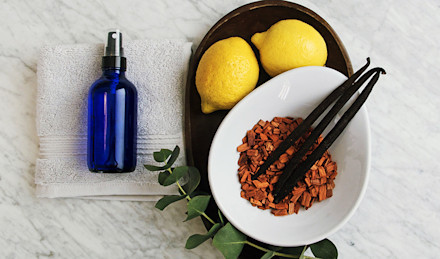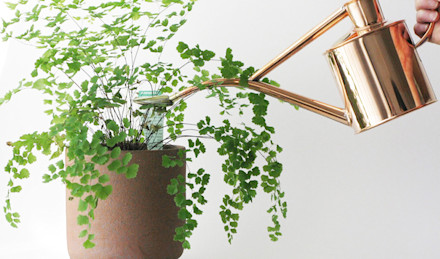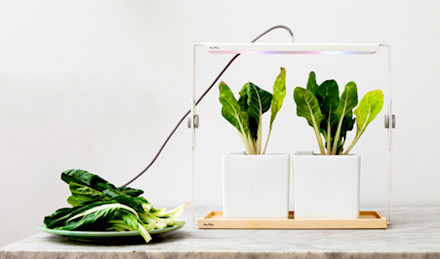Beyond responsibly manufacturing our bedding and bath products, we’re always on the lookout for ways to live in harmony with Mother Nature at home. Our bedding is beautifully packaged in a reusable, self-care bag and our towels in a custom, Parachute laundry bag – making both ideal for storing, gifting and reducing waste. Here are a few tips on taking care of your space while minding your health and the environment, too.

Clean House, Clean Conscience
If you’re deep cleaning, you don’t necessarily need deep chemicals. An environmentally friendly cleaner can get the job done. Readymade solutions are widely available, – Grove Collaborative is our favorite one-stop-shop – but there are easy-to-make options galore – even for the toughest jobs. Some of our recent DIY discoveries include:
Air Freshener:Dilute clear alcohol (like gin or vodka) with water in a one-to-six ratio and add 20-40 drops of your favorite essential oil. We especially like uplifting bergamot, relaxing lavender and sensual jasmine.
Window Cleaner:Put down the paper towels. When The New York Times tested window washing methods, they found that reusing pages from their very own Sunday Styles worked best — leaving lint-free, streak-free surfaces. Instead of reaching for the bright blue bottle, mix one part white vinegar and two parts water with a few teaspoons of rubbing alcohol for an environmentally gentle formula.
Repurposed Peels:Citrus is a go-to ingredient for many green cleaners — lemon juice can be used for everything from polishing copper to whitening tennis shoes. This recipe infuses vinegar with leftover citrus peels to tackle grease and soap scum on stovetops, sinks and other tile surfaces.
Extra Grimy Gear:Combine a few tablespoons of tea tree oil — which is naturally antibacterial and antiviral — with water in a spray bottle to take care of odors and germs. This powerful mold fighter is equally effective on kitchen counters and yoga mats.
Clean House, Clean Conscience
If you’re deep cleaning, you don’t necessarily need deep chemicals. An environmentally friendly cleaner can get the job done. Readymade solutions are widely available, – Grove Collaborative is our favorite one-stop-shop – but there are easy-to-make options galore – even for the toughest jobs. Some of our recent DIY discoveries include:
Air Freshener:Dilute clear alcohol (like gin or vodka) with water in a one-to-six ratio and add 20-40 drops of your favorite essential oil. We especially like uplifting bergamot, relaxing lavender and sensual jasmine.
Window Cleaner:Put down the paper towels. When The New York Times tested window washing methods, they found that reusing pages from their very own Sunday Styles worked best — leaving lint-free, streak-free surfaces. Instead of reaching for the bright blue bottle, mix one part white vinegar and two parts water with a few teaspoons of rubbing alcohol for an environmentally gentle formula.
Repurposed Peels:Citrus is a go-to ingredient for many green cleaners — lemon juice can be used for everything from polishing copper to whitening tennis shoes. This recipe infuses vinegar with leftover citrus peels to tackle grease and soap scum on stovetops, sinks and other tile surfaces.
Extra Grimy Gear:Combine a few tablespoons of tea tree oil — which is naturally antibacterial and antiviral — with water in a spray bottle to take care of odors and germs. This powerful mold fighter is equally effective on kitchen counters and yoga mats.

Breathe Easier
NASA scientists have found a decidedly terrestrial solution for improving the quality of stagnant air: Common houseplants. Aloe, peace lilies and ficus all made the cut for their ability to rid the air of pollutants like benzene, formaldehyde and trichloroethylene. If you’re not quite a green thumb (don’t worry, you’re not alone), consult with our friends at The Sill. Or simply opt for a Spider Plant or the charmingly named Mother-in-Law’s Tongue — both are virtually impossible to kill.
Breathe Easier
NASA scientists have found a decidedly terrestrial solution for improving the quality of stagnant air: Common houseplants. Aloe, peace lilies and ficus all made the cut for their ability to rid the air of pollutants like benzene, formaldehyde and trichloroethylene. If you’re not quite a green thumb (don’t worry, you’re not alone), consult with our friends at The Sill. Or simply opt for a Spider Plant or the charmingly named Mother-in-Law’s Tongue — both are virtually impossible to kill.

Water Wise
Whether or not you live in California, it’s time to get serious about reducing your water footprint. Consider the facts: The World Health Organization recommends two gallons per person daily to meet basic hydration needs plus five gallons to cover personal hygiene and food hygiene needs. However, the average American resident uses about 100 gallons of water per day. You can start with small adjustments, like opting to compost kitchen waste instead of using the garbage disposal and watering your new houseplants with greywater (leftover from cooking and bathing). For more methods on cutting, check out these ideas and simple swaps.
Water Wise
Whether or not you live in California, it’s time to get serious about reducing your water footprint. Consider the facts: The World Health Organization recommends two gallons per person daily to meet basic hydration needs plus five gallons to cover personal hygiene and food hygiene needs. However, the average American resident uses about 100 gallons of water per day. You can start with small adjustments, like opting to compost kitchen waste instead of using the garbage disposal and watering your new houseplants with greywater (leftover from cooking and bathing). For more methods on cutting, check out these ideas and simple swaps.

Connect With Tech
Reduce, reuse, recycle – there’s an app for that (naturally). Tap into online resources to discover new ways to live mindfully. Some favorites include Local Harvest, which makes finding locally grown food easy, and Environmental Working Group’s Skin Deep app, which makes cleaning up your cosmetics routine easy. And if you’re like us and applying the “KonMari” method to your closet this season, don’t overlook resale sites to re-home your unwanted threads and make a little cash while you’re at it. Racked has an excellent, comprehensive guide to your myriad options.
Connect With Tech
Reduce, reuse, recycle – there’s an app for that (naturally). Tap into online resources to discover new ways to live mindfully. Some favorites include Local Harvest, which makes finding locally grown food easy, and Environmental Working Group’s Skin Deep app, which makes cleaning up your cosmetics routine easy. And if you’re like us and applying the “KonMari” method to your closet this season, don’t overlook resale sites to re-home your unwanted threads and make a little cash while you’re at it. Racked has an excellent, comprehensive guide to your myriad options.




